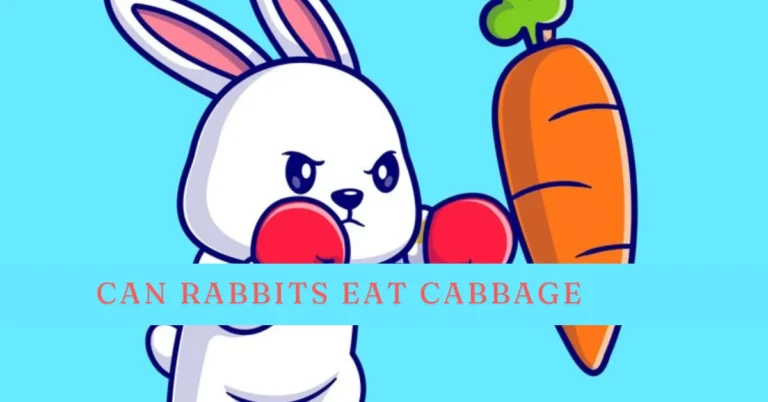Introduction to Cabbage and Rabbits
Cabbage is a leafy green vegetable that often finds its way into our salads and stir-fries. But what about our furry friends? Can rabbits eat cabbage without facing any consequences? As rabbit owners, we want to ensure that we’re providing the best diet possible for our little companions. Understanding what they can safely munch on is essential for their well-being.
In this post, we’ll dive deep into the world of cabbage and explore its nutritional value, potential benefits, and risks associated with feeding it to rabbits. Whether you’re a seasoned bunny parent or new to the rabbit-raising community, knowing how to properly nourish your pet will keep them hopping happily! Let’s get started on this crunchy journey together!
Nutritional Value of Cabbage for Rabbits
Cabbage can be a delightful addition to your rabbit’s diet, offering a range of nutrients essential for their well-being. It is low in calories, making it suitable for maintaining a healthy weight.
This leafy vegetable is rich in vitamins C and K. Vitamin C plays a crucial role in supporting the immune system, while vitamin K aids in proper blood clotting.
Moreover, cabbage contains dietary fiber, which promotes good digestive health. A high-fiber diet helps prevent gastrointestinal issues that rabbits often face.
Minerals like calcium and potassium are also found in cabbage. While beneficial, moderation is key due to potential calcium buildup if fed excessively.
The crunchiness of fresh cabbage can keep your bunny engaged during mealtime too!
Potential Health Benefits of Feeding Cabbage to Rabbits
Cabbage can be a delightful treat for rabbits when offered in moderation. It packs a punch in terms of vitamins and minerals, particularly vitamin K and C. These nutrients contribute to overall health, boosting the immune system and promoting strong bones.
The fiber content in cabbage aids digestion. A well-functioning digestive system is vital for rabbits, as they rely on high-fiber foods to keep their gut moving smoothly.
Moreover, cabbage has antioxidant properties that can help combat oxidative stress. This means it may play a role in reducing inflammation within your rabbit’s body.
Rabbits often enjoy the crunchy texture of fresh cabbage leaves. The enjoyment factor shouldn’t be overlooked; happy bunnies are more likely to thrive! Just ensure you introduce this veggie gradually into their diet for optimal results.
Risks and Concerns with Feeding Cabbage to Rabbits
While cabbage can be a tasty treat for rabbits, it does come with some risks. One major concern is its high fiber content. Rabbits require a balanced diet low in excessive carbohydrates but rich in fiber. Too much cabbage might disrupt their digestive system.
Additionally, cabbage contains goitrogens, compounds that can interfere with thyroid function if consumed in large amounts over time. This could lead to health issues down the line.
Some rabbits may also be sensitive to certain vegetables. Introducing cabbage suddenly could cause gas or bloating, leading to discomfort and even serious digestive problems.
Watch for any signs of distress after feeding your rabbit this vegetable. Keep an eye on their droppings and overall behavior when introducing new foods to ensure they remain healthy and happy.
Other Vegetables that are Safe for Rabbits to Eat
Rabbits love variety in their diet, and many vegetables are safe for them to munch on. Leafy greens like kale and romaine lettuce make excellent choices. They provide essential nutrients without overwhelming a rabbit’s digestive system.
Carrots are a popular treat but should be given sparingly due to their high sugar content. Bell peppers offer a crunchy texture and vibrant colors that delight rabbits while providing vitamins A and C.
Broccoli is another vegetable that can be included in moderation, as it contains fiber and other beneficial compounds. Zucchini is also a great option; it’s hydrating and low-calorie, perfect for keeping your furry friend cool.
Always remember to introduce new veggies slowly to monitor any reactions. Each rabbit has its preferences, so experimenting with different options will help you discover what your pet enjoys most!
How Much Cabbage Should be Fed to Rabbits?
When it comes to feeding can rabbits eat cabbage moderation is key. This leafy vegetable can be a delightful treat but should not dominate their diet.
A small portion, about one or two tablespoons of chopped cabbage per day for an average-sized rabbit, is ideal. This amount allows them to enjoy the taste without overwhelming their digestive systems.
It’s essential to introduce this veggie gradually. Start with just a tiny piece and observe how your rabbit reacts before increasing the serving size. Each rabbit has its own unique tolerance levels.
Always ensure that fresh water is available alongside any new food items. Hydration plays an important role in digestion.
Monitoring your bunny’s health after introducing cabbage is crucial. If you notice any signs of discomfort or changes in behavior, reconsider the quantity or frequency of this treat.
Conclusion: Proper Nutrition for Happy and Healthy Rabbits
Proper nutrition plays a vital role in the health and happiness of rabbits. While cabbage can be included in their diet, it’s essential to approach it with caution. The nutritional benefits are present, but so are potential risks if not managed correctly. Offering small amounts as an occasional treat can help maintain balance.
Always remember that variety is key when feeding your rabbit. Incorporating a wide range of vegetables ensures they receive necessary nutrients while keeping mealtime exciting. By focusing on safe options and monitoring portion sizes, you set the foundation for a thriving bunny companion.
Your rabbit’s well-being depends on thoughtful dietary choices. Investing time into understanding what foods suit them best will lead to happier days filled with binkies and playfulness. Prioritize proper nutrition, and your furry friend will surely thank you with every hop!
FAQs
Q: Can rabbits eat cabbage every day?
Ans: No, rabbits should not eat cabbage every day. It can cause digestive issues if given too frequently. Moderation is key.
Q: What type of cabbage is best for rabbits?
Ans: Green cabbage is generally safe for rabbits, but it’s best to introduce it gradually and in small amounts to ensure your rabbit tolerates it well.
Q: Are there any risks in feeding cabbage to rabbits?
Ans: Yes, overfeeding cabbage can lead to gas and bloating in rabbits. Always monitor your rabbit for any adverse reactions.
Q: How much cabbage can I give my rabbit?
Ans: A small leaf or two of cabbage, 2-3 times a week, is sufficient. Always combine it with other vegetables to provide a balanced diet.
Q: What should I do if my rabbit has a bad reaction to cabbage?
Ans: If your rabbit shows signs of digestive discomfort, such as bloating or diarrhea, stop feeding cabbage and consult your veterinarian for advice.

